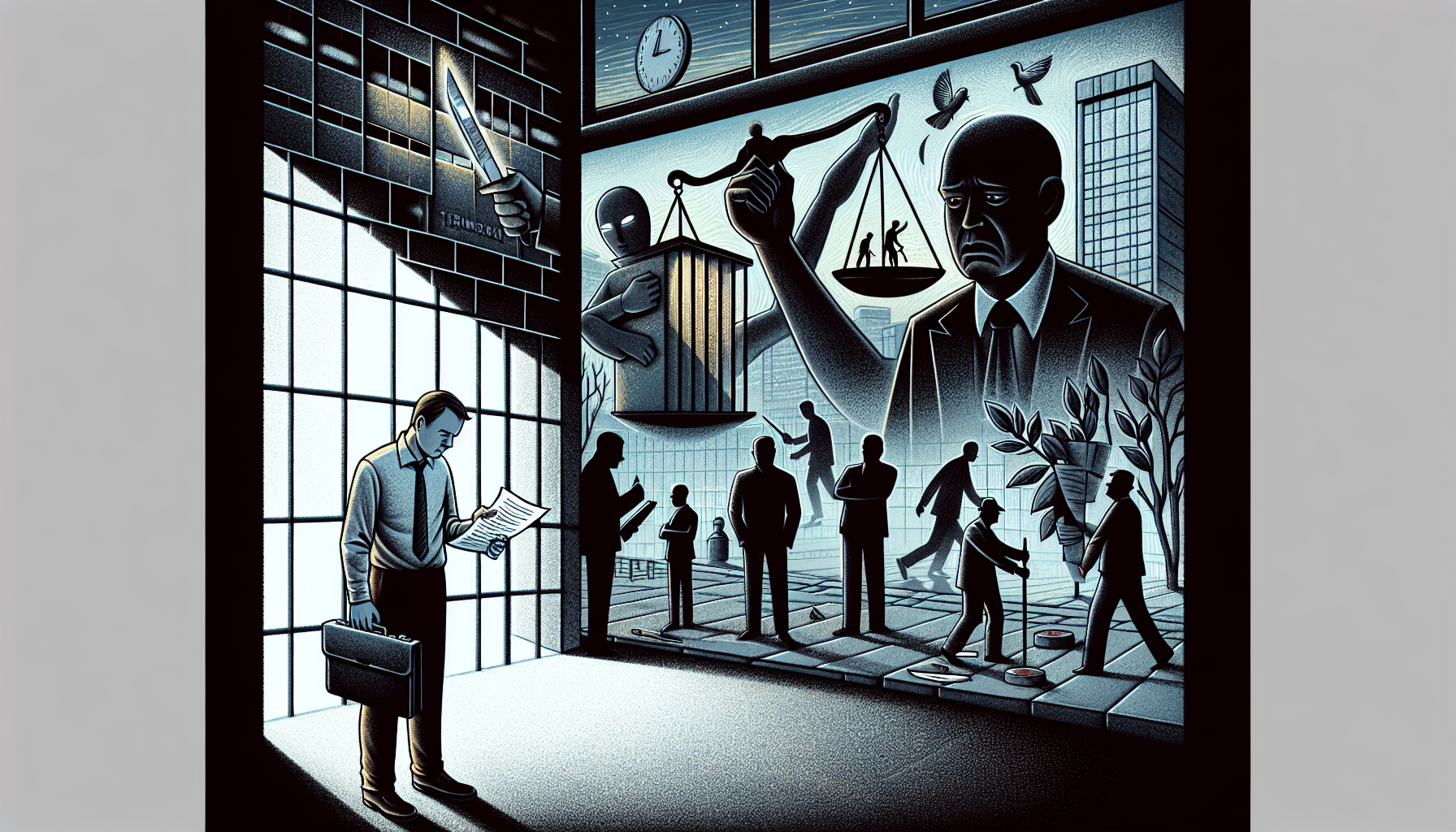How To Prove A Wrongful Termination Claim in California
Think you were wrongfully terminated in California? Navigating the complexities of wrongful termination can be daunting, but understanding your rights and the legal framework can empower you to take action. This guide will help you grasp the concept of wrongful termination, the steps to prove it, and the legal protections available to you. We’ll delve into the primary grounds for wrongful termination claims, methods for gathering evidence, and the procedures for challenging an unjust dismissal. Whether you’re dealing with discrimination, retaliation, or other unlawful termination reasons, this article aims to provide the clarity and support you need to seek justice.
Key Takeaways
- In California, wrongful termination occurs when an employee is fired for reasons that violate state or federal laws, such as discrimination or retaliation.
- Although California follows an at-will employment doctrine, exceptions exist that protect employees from being unjustly terminated for illegal reasons.
- Employees can pursue wrongful termination claims on grounds such as discrimination, retaliation, or violations of public policy, with strong protections from both state and federal laws.
Understanding Wrongful Termination in California

When an employer fires an employee for reasons that violate state or federal laws, it is considered wrongful termination. California law outlines specific scenarios where termination is deemed illegal, such as discrimination, retaliation, or breach of an employment contract. These wrongful termination laws protect all employees, including part-time, full-time, temporary, and probationary workers, from unlawful termination.
Wrongful termination can occur under a variety of circumstances. Discriminatory practices, violation of public policy, and failing to adhere to company guidelines are just a few examples of situations that might be considered wrongful termination. Familiarity with these laws and protections is the first step towards contesting an unjust dismissal.
At-Will Employment and Its Limits
California operates under the principle of at-will employment, meaning that employers and employees can terminate their working relationship at any time, for any reason, or even for no reason at all. However, this does not give employers carte blanche to fire employees for unlawful reasons. Even under at-will employment, terminations must adhere to legal, non-discriminatory reasons to avoid wrongful termination claims.
There are several exceptions to the at-will employment doctrine. For instance, employers cannot terminate employees based on discrimination, retaliation, or violations of public policy. California law upholds wrongful termination claims arising from such violations, protecting employees from unfair and illegal dismissals.
Common Grounds for Wrongful Termination Claims

Wrongful termination claims often stem from three primary grounds: discrimination, retaliation, and wrongful discharge in violation of public policy. Each of these categories encompasses a range of specific scenarios where an employee might be unlawfully dismissed in a wrongful termination case.
Recognizing these common grounds can help ascertain if your termination was illegal and if you have a valid claim.
Discrimination Based on Protected Characteristics
Discrimination is one of the most prevalent grounds for wrongful termination claims in California. If an employer fires an employee based on race, religion, age, gender, or other protected characteristics, it constitutes wrongful termination. The California Fair Employment and Housing Act (FEHA) and the Civil Rights Act of 1964 provide robust protections against such discriminatory practices, ensuring fair employment for all.
Instances of workplace discrimination can take many forms, from denying pregnancy-related accommodations to racial stereotyping and unfair hiring practices. Sexual harassment also falls under this category, with laws explicitly prohibiting termination for rejecting sexual advances or for reporting such behavior. Employees from any protected class who face unfair treatment have the right to pursue a wrongful termination claim.
Retaliation for Reporting Violations
Retaliation occurs when an employer terminates an employee for reporting illegal activities, health or safety hazards, or wage and hour violations. For example, if an employee reports sexual harassment to HR and is subsequently fired, this could be grounds for a wrongful termination lawsuit. California Labor Code protects employees who blow the whistle on illegal practices, ensuring they are not penalized for their actions.
Employees are also protected from retaliation for requesting reasonable accommodations, participating in investigations, or filing workers’ compensation claims. If you suspect termination for such reasons, consulting an experienced employment attorney can help evaluate your case and gather supporting evidence.
Violation of Public Policy
The public policy exception to at-will employment protects employees from being fired for actions that align with public policy, such as reporting illegal activities or fulfilling civic duties like jury duty. Terminating an employee for refusing to engage in illegal activities or for complying with legal obligations constitutes wrongful termination.
Even if an employee resigns due to a hostile work environment, they may still file a wrongful termination lawsuit.
Understanding Wrongful Termination in California

In California, proving wrongful termination involves demonstrating that the termination was based on illegal reasons. Gathering evidence such as emails, performance reviews, and witness statements is essential to build a strong case. Knowing the legal grounds for wrongful termination, like discrimination, retaliation, or violation of public policy, is key to filing a successful claim.
The legal process for filing a wrongful termination claim can be complex. It typically involves submitting a complaint to the appropriate agency, such as the California Labor Commissioner’s Office, and possibly pursuing a lawsuit if the issue is not resolved. Proving your case requires meticulous documentation and a clear demonstration of how the termination violated employment laws.
How to Prove Wrongful Termination in California
Proving wrongful termination in California requires a systematic approach to gather and present compelling evidence. Here are the key steps to build a strong case:
1. Understand the Grounds for Wrongful Termination
First, it’s crucial to identify the specific grounds for your wrongful termination claim. Common grounds include:
- Discrimination: Termination based on race, gender, age, religion, disability, or other protected characteristics.
- Retaliation: Being fired for reporting illegal activities, workplace safety violations, or for participating in protected activities.
- Violation of Public Policy: Termination for reasons that violate public policy, such as refusing to engage in illegal activities or fulfilling civic duties.
2. Gather Evidence
Collecting robust evidence is essential to support your claim. Consider the following types of evidence:
- Documentation: Emails, performance reviews, memos, and any written communication that may demonstrate the reason for your termination.
- Witness Statements: Testimonies from coworkers or others who can corroborate your account of events.
- Employment Records: Your employment contract, employee handbook, and records of any disciplinary actions taken against you.
- Timeline of Events: A detailed timeline of events leading up to your termination, including any incidents of discrimination, harassment, or retaliation.
3. File a Complaint with the Appropriate Agency
In California, wrongful termination claims can be filed with agencies like the California Department of Fair Employment and Housing (DFEH) or the Equal Employment Opportunity Commission (EEOC). Filing a complaint with these agencies is often a prerequisite before pursuing a lawsuit.
4. Consult with an Employment Attorney
If you suspect wrongful termination, contacting Greenberg Gross LLP can be a crucial step towards seeking justice. The firm offers a free initial consultation to discuss your wrongful termination claim, helping you understand your rights and the next steps to take with a wrongful termination lawyer and wrongful termination lawyers.
Greenberg Gross LLP is committed to fighting for the rights of wrongfully terminated employees. Their experienced team can assist in documenting the details of your termination, gathering evidence, and representing you throughout the legal process.
Reach out to secure the compensation and justice you deserve if you believe you have been wrongfully terminated in California.
5. Pursue Legal Action
If your complaint is not resolved through the agency, you may need to file a lawsuit. Your attorney will assist in drafting the complaint, gathering additional evidence, and representing you in court.
6. Demonstrate the Employer’s Intent
Proving wrongful termination often hinges on demonstrating that your employer’s stated reason for termination was a pretext for illegal motives. This can involve showing inconsistencies in the employer’s explanation, evidence of discriminatory practices, or patterns of retaliation.
7. Seek Remedies
If your claim is successful, you may be entitled to various remedies, including:
- Reinstatement: Returning to your former job position.
- Back Pay: Compensation for lost wages and benefits.
- Damages: Monetary compensation for emotional distress, punitive damages, and legal fees.
By meticulously following these steps and leveraging legal expertise, you can build a compelling case to prove wrongful termination in California and seek the justice you deserve.
Legal Protections Under State and Federal Laws

California employees are safeguarded by both state and federal laws designed to prevent wrongful termination. These laws include the implied covenant of good faith and fair dealing, which mandates that employers must not interfere unfairly with an employee’s ability to perform their job duties in accordance with their employment contracts. Experienced California employment attorneys can provide guidance on these protections.
Breaches of this covenant, such as deliberate inaction or lack of communication, can form the basis of a wrongful termination claim.
California Family Rights Act (CFRA)
The California Family Rights Act (CFRA) provides critical protections for employees taking family or medical leave. Under CFRA, it is unlawful for employers to retaliate against employees for taking such leave. If an employee is terminated during CFRA leave or within 90 days of their return, the termination is presumed wrongful. This presumption allows employees to pursue a wrongful termination lawsuit if they believe their dismissal was related to their leave.
Employers must hold an employee’s job or offer equivalent responsibilities upon their return from the medical leave act, protecting employees from penalties for taking legitimate health-related time off. Violations of these provisions can lead to significant legal consequences for the employer.
Fair Employment and Housing Act (FEHA)
The Fair Employment and Housing Act (FEHA) is a cornerstone of California’s employment law framework, prohibiting employers from firing individuals based on:
- race
- gender
- age
- disability
- other protected characteristics
FEHA defines specific protections to address wrongful termination related to discrimination, ensuring fair treatment for all employees.
Enforced by the California Civil Rights Department, FEHA’s provisions apply to all employers in the state, with additional age discrimination protections for those over 40. Understanding these protections is crucial for employees facing discriminatory practices in the workplace.
Federal Laws and Regulations
Federal laws such as the Civil Rights Act and the Americans with Disabilities Act play a vital role in protecting employees from wrongful termination. The Civil Rights Act prohibits employment discrimination based on race, color, religion, sex, or national origin, providing a robust framework for safeguarding employees. Similarly, the Americans with Disabilities Act ensures that individuals with disabilities are not unjustly fired.
These federal protections complement state laws, offering a comprehensive legal shield against wrongful termination and discrimination. Employees can rely on these laws to seek justice and fair treatment in the workplace.
Contact Greenberg Gross Today
Remember, wrongful termination can have significant financial and emotional impacts. By understanding your rights and the legal process, you can navigate the complexities of filing a claim and seek the justice and compensation you deserve. Stay informed, stand up for your rights, and don’t hesitate to seek professional legal help if you need it.
If you suspect wrongful termination, contacting Greenberg Gross LLP can be a crucial step towards seeking justice. The firm offers a free initial consultation to discuss your wrongful termination claim, helping you understand your rights and the next steps to take with a wrongful termination lawyer and wrongful termination lawyers.
Greenberg Gross LLP is committed to fighting for the rights of wrongfully terminated employees. Their experienced team can assist in documenting the details of your termination, gathering evidence, and representing you throughout the legal process.
Reach out to secure the compensation and justice you deserve.
Frequently Asked Questions
What is considered wrongful termination in California?
Wrongful termination in California occurs when an employee is terminated for illegal reasons, such as discrimination, retaliation, or in violation of public policy. It is essential to understand your rights to ensure fair treatment in the workplace.
Can I be fired for reporting workplace safety violations?
You cannot be fired for reporting workplace safety violations, as such actions are deemed retaliation and are illegal under California Labor Code. It is crucial to know your rights in order to maintain a safe working environment.
What should I do if I believe I was wrongfully terminated?
If you believe you were wrongfully terminated, it is essential to gather evidence, such as emails and performance reviews, and consult with an experienced employment attorney. Additionally, consider filing a complaint with the relevant labor authority to protect your rights.
How does the California Family Rights Act protect employees?
The California Family Rights Act protects employees by offering job-protected leave for family or medical reasons and prohibiting retaliation against those who exercise this right. This ensures that employees can attend to their personal and family health needs without fear of losing their job.
Are federal laws different from state laws in protecting against wrongful termination?
Federal laws provide essential protections against wrongful termination and discrimination, but state laws can offer additional or different safeguards. Therefore, both layers of legislation work together to strengthen employee rights.

